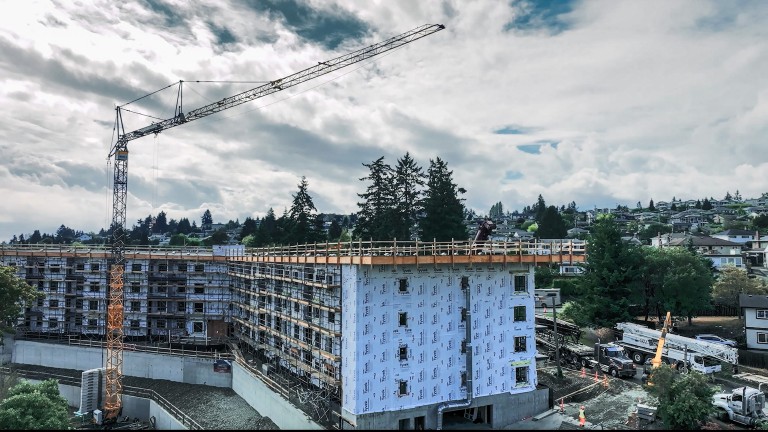An apartment complex is taking shape near Departure Bay in the Canadian coastal town of Nanaimo, B.C. The Liebherr 81 K.1 fast-erecting crane was supplied by Bigfoot Crane Company Inc. Working in tight conditions, the machine proved its capability in Vancouver Island’s second-largest city.
Construction of the Departure Bay apartment building presented Bigfoot Crane and the contractor Westurban Developments with several challenges, largely due to the complex nature of the structure and the conditions on-site. Meticulous planning beforehand, followed by precise implementation, was crucial for the crane’s successful operation.
Handling challenging conditions
Cale Anderson, managing director at Bigfoot Crane, describes the project’s specific challenges: “It’s easy to get a crane onto site when there isn’t a building yet. But additional challenges arise once the building is erected because of its structure. When we’re planning a project, we always start by looking at how to remove the crane at the end.”
The site’s access road was used for assembling the fast-erecting crane. But disassembling the 81 K.1 proved to be a tougher challenge.
“The completed building was in the way as far as normal dismantling was concerned,” explains Anderson. “This meant the fast-erecting crane had to be lifted over the newly constructed building. A large Liebherr mobile crane was used to safely set the 81 K.1 down on the other side of the building.”
This job was all about flexibility, technical expertise and being able to think outside the box. “As well as the challenges on site requiring the right equipment, we also needed a team willing to find creative and innovative solutions,” adds Anderson.
With help from LIebherr’s technology
Cale Anderson is impressed by the Liebherr crane’s features and sees potential for fast-erecting cranes in North America. The hoist rope’s two-fall operation and the Load Plus feature caught his attention. Both functions ensure fast lifting speeds and allow heavy loads to be lifted.
“Our customers especially appreciate the crane’s speed and performance that these features make possible,” says Anderson. The fast-erecting crane has played an integral role in various construction tasks, including trailer unloading, concrete work, and the installation of rooftop equipment. While working in British Columbia, the 81 K.1 proved to be the ideal lifting partner when used with several other cranes on site. Its maximum hook height of 38.9 metres combined with 2.4 metre tower sections meant it was able to maintain the necessary safety distance between other cranes and buildings in its vicinity and to slew above or below other cranes, depending on the circumstances.
The 81 K.1 can lift up to 6,000 kilograms. It can reach a maximum radius of 48 metres and has a jib head lifting capacity of 1,350 kilograms.
Partnering with Bigfoot Crane
Bigfoot Crane has 36 cranes in its fleet, six of them are from Liebherr.
“The flexibility and adaptability of Liebherr cranes are key elements in our success. Liebherr understands what we need and works closely with us to ensure we always get the best equipment and service. The versatility of Liebherr cranes allows us to efficiently handle a broad range of projects,” explains Anderson.
Read the full article here

